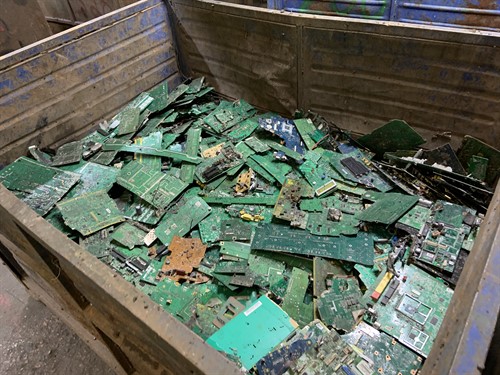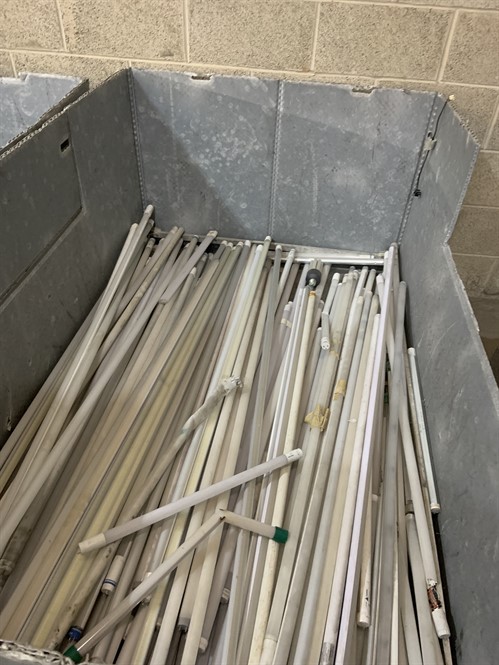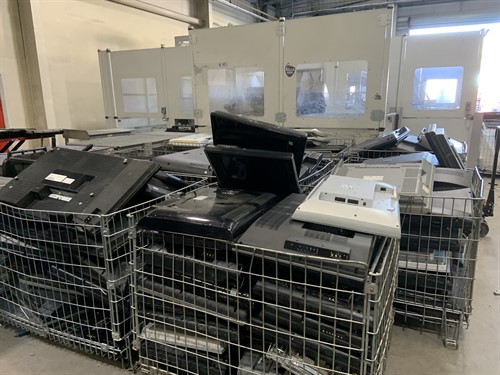Exposure During E-waste & Battery
Recycling
HSE are participating in a large scale European study called
PARC (https://www.eu-parc.eu/), to
determine whether there is any occupational exposure to lithium,
aluminium, chromium, cobalt, nickel, cadmium, antimony, mercury,
lead and flame retardants during the recycling processes of
electronic waste (e-waste) and batteries.
The European Commission have adopted a new Circular Economy
Action Plan, with measures along the entire life cycle of e-waste
products aiming for the product of today to be the raw material of
tomorrow. The waste management sector is expected to play a pivotal
role in this plan and it is anticipated that as this plan grows, so
too will the number of waste management workers exposed to
chemicals such as lithium, aluminium, chromium, cobalt, nickel,
cadmium, antimony, mercury and lead and flame retardants.

What are the aims of the project?
The aims of the
project are:
- to provide new exposure data on e-waste/battery recycling
workers through biological and environmental monitoring;
- to understand if regulation in place limits the presence of
harmful substances within the circular economy;
- to provide scientifically based recommendations for employers,
workers and policy.
In order to undertake the study, we need volunteer companies to
allow us to visit their sites to take samples and collect
information.
What we are asking from your company?
From each participating company we are seeking up to 20 workers
whose duties involve e-waste and/or battery recycling. We are also
requesting up to 10 workers who do not work directly with e-waste
or batteries, for example, administrative staff. These will be used
as comparison control group.

What samples are requested?
The study will request two urine samples from each
occupationally exposed worker. One at the start of the working week
(for example Monday morning) and a second towards the end of the
working week (for example Thursday afternoon). In addition to this,
on the end of the working week day we will also undertake personal
air sampling and hand wipe sampling, in addition to collecting some
contextual information from a company representative as well as the
workers.
A single urine sample will be requested from the administrative
workers, but no air sampling or hand wipes will be required.
How do we collect these samples?
A member of the UK research team will come to site at the start
of the working week (e.g. Monday morning) to collect a urine sample
from each worker taking part in the study. This is expected to take
approximately 15 - 20 minutes on site.
Later in the working week (e.g. Thursday full day) members of
the UK research team to come onto site for a full day visit. The
research team will collect information on relevant processes and
work activities as well as personal air samples and hand wipes. In
addition, the second urine samples will be collected from workers
before the end of shift.
What will we do with the samples?
All the samples will be analysed for lithium, aluminium,
chromium, nickel, cobalt, cadmium, antimony, mercury and lead and
flame retardants. In addition, the urine samples will be analysed
for specific gravity and creatinine to correct for concentration or
dilution (hydration) of the urine for the purposes of standardising
the results.
What will do with the results?
You will receive a report of the individual urine and air
monitoring results for the named chemical elements. Due to a lack
of current interpretation, you will receive only a comment on the
hand wipes, regarding possible skin exposure, and the flame
retardant results.
Your workers will also receive their own individual results in
the same manner.
Do we have to take part?
Your involvement in this study is completely up to you. If you
do decide to take part you will be asked to sign a company consent
form and on the first day of sampling your workers will also be
asked to sign a worker consent form. Both company and worker
information sheets will be made available to you in advance to
enable you and your workers to fully understand the study and what
we are asking of participants.
Even after you have consented you (and individual workers) are
still free to withdraw at any time and without giving reason.

Will you help?
UK scientists are trying to understand the potential exposure to
e-waste and battery recycling workers. This pan-European study will
help you comply with your possible obligations under the UK
Chemicals legislation (UK-REACH) and under the EU Directive on
carcinogens or mutagens at work (Directive 2004/37/EC) and the EU
Chemicals Agents Directive (Directive 98/24/EC).
Taking part will also mean you will receive urine and air
monitoring results for lithium, aluminium, chromium, cobalt,
nickel, cadmium, antimony, mercury and lead. There will be no
financial cost to you for this information although we will require
some time and co-operation from you and your workers.
Your workers will gain an awareness regarding the safety
measures that they need to follow when carrying out their work
tasks in waste recycling.
You will be contributing to the awareness of potential hazards,
to promote and develop a good working practice within
e-waste/battery recycling which will be sustainable as recycling
and the waste circular economy grows.
If you would like to discuss this project further or to
volunteer, please contact Dr
Liz Leese..
Thank you for reading this
and I hope that you will be interested to participate.